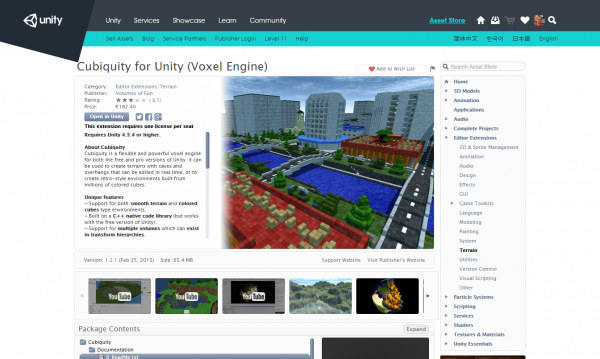Well we’ve got some exciting news today – we’re pleased to announce that Cubiquity for Unity3D is now available for free! It has always been free for non-commercial and evaluation use, but we are removing this restriction so that you can use the system for commercial purposes too. This is effective immediately, and you can download Cubiquity for Unity3D via the asset store or from BitBucket.

Cubiquity let’s you create natural voxel terrains and edit them in real time, or build your worlds from millions of tiny colored cubes.
So what has led to this decision? Well, there are a number of factors at play here:
Time restrictions: Over the last year we have spent a lot of time developing Cubiquity for Unity, but I anticipate time being less plentiful in the future. I’ve just accepted a new job as a senior software engineer, expect to be moving house in the coming year, and we have also had Voxeliens be accepted onto Steam. With less time available for development and support I don’t feel comfortable charging money for the system.
Research aims: There is a huge difference between a research-oriented project and a commercial one. Selling Cubiquity for Unity3D means a lot of work has to go into the workflow, documentation, support, and other tasks which are frankly not much fun. I’d rather shift the focus and spend more time developing cool features and demos, or doing more general voxel research.
Increase number of users: Getting paid for developing Cubiquity for Unity3D definitely has it advantages, but I can honestly say that the satisfaction of seeing someone else use your system is far more rewarding. We really hope that going free can further increase adoption and that we’ll see more games building on Cubiquity.
So what’s the catch?
There isn’t really a catch, but users should be aware that the core Cubiquity library remains closed source. A precompiled version of this Cubiquity library is shipped with Cubiquity for Unity3D and you can use this mostly as you please (see asset store terms and conditions) but you don’t have the source code to build it yourself. You do however have the C# scripts and shader code which integrate this library with Unity.
We do still have further opportunities to generate revenue from Cubiquity by charging for source code licenses, charging for additional platforms (e.g. mobile), or offering contract services. I don’t yet know if we’ll pursue any of these but there are no short-term plans to do so.
What about Unreal Engine 4 (UE4)?
In principle none of the above should affect Cubiquity for UE4. Matt is still working on this though again he is limited to his spare time. The pricing and distribution model for Cubiquity for UE4 may or may not match the Unity version – we simply haven’t decided this yet.
Support
All support for Cubiquity for Unity3D will be handled through our existing thread on the Unity forums. There is also a board on our own Volumes of Fun forum, but we encourage users to use the Unity thread where possible as it boosts the visibility of the system and shows an active community. Please avoid sending email or private messages unless the content really needs to be private, as we try to keep communication open where possible.
Anyway, we hope you enjoy playing with Cubiquity for Unity3D and look forward to seeing what you create!


I’ve been a fan of voxel terrains ever since I saw the early work of Ken Silverman (http://www.advsys.net/ken/voxlap.htm)
We certainly appreciate that Cubiquity is now free to use, and for commercial use no less!
All the best with the new job and moving house.
-Alan
Glad you like it – Ken’s work has indeed been a huge inspiration!
Source code of the native library is not so important for me as we have PolyVox. In the meantime, I already wrote my own DLL that uses PolyVox and ANL Library that generates meshes and splatting data for Unity, and it works very well 🙂
Hi, I was looking at this and it seemed like the architecture supported additional types of volume renderers, but the existing volume renderers plugged directly into proprietary code, so it wasn’t apparent that this was actually an option. I’m interesting in adding a textured block renderer, is that actually possible, even by making my own native library?
Unfortunately it is not possible for you (as an end user) to add this functionality as it would need to be supported inside the native-code library. Actually we made a conscious decision not to focus on textured cubes to avoid being seen as yet another Minecraft clone, but I must admit it has been one of the more popular features requests.
There are no short-term plans for this to be added, though it could be that in the future we expose the ability for users to define their own voxel types and so you could then add this yourself. But don’t hold your breath for this as polishing the existing volume types is higher priority.
Pingback: Reflections on Cubiquity and finding the path forward - Volumes Of Fun